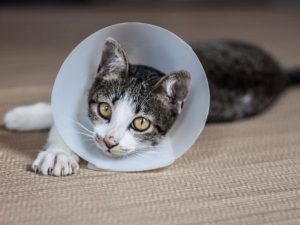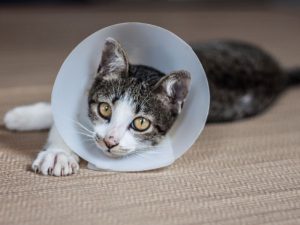
What is done during castration?
The vet will open the scrotum of the cat with a small incision, followed by tying and cutting off the testicles. Following the removal of the testicles, they will usually suture the wound to prevent infection. The operation does not take too long so you can normally pick up the cat around an hour later. The vet will remove the cat’s ovaries, and in some cases the uterus. They will make one or two small cuts and then tie and remove the ovaries. The female surgery takes longer than a male castration and has a stronger effect on the cat. Vets often use self-dissolving stitching.What happens to the animal’s body directly after castration?
During the process anesthesia enables the cat to loose consciousness and its pain perception stops functioning. In addition, the vet will administer a muscle relaxant to prevent sudden movements, which are subconsciously triggered during the cat’s sleep. The narcotic drug acts on their central nervous system, resulting in a deep sleep that will cease when an antidote is administered or when the narcotic breaks down. They give analgesics to the animals during the operation and will be continuously fed into their body. Especially in the hours after, they require as much pain reduction as possible. Analgesics and narcotics act on the central nervous system, for example by blocking receptors or nerve cells that have an inhibitory effect. Even hours after waking up, these substances are still in their system which leads to a cat’s behaviour change after castration. Therefore, you should expect some of the following:
· Staggering
· Vomiting
· Lots of sleep
· Disorientation
· Coordination weakness
All in all, however, the symptoms should not last longer than 48 hours. Abnormal behaviour includes diarrhoea, refusal to be fed, fever, apathy (when a cat is not responsive and does not move), low temperature or a hot red wound (infection!). If these signs show it is best to go to the doctor within a day, however you may leave it for up to a maximum of 48 hours. It is important to make sure that your cat stays hydrated after such an operation so make sure you have your pet water fountain ready!
a cat’s behaviour change after castration. Therefore, you should expect some of the following:
· Staggering
· Vomiting
· Lots of sleep
· Disorientation
· Coordination weakness
All in all, however, the symptoms should not last longer than 48 hours. Abnormal behaviour includes diarrhoea, refusal to be fed, fever, apathy (when a cat is not responsive and does not move), low temperature or a hot red wound (infection!). If these signs show it is best to go to the doctor within a day, however you may leave it for up to a maximum of 48 hours. It is important to make sure that your cat stays hydrated after such an operation so make sure you have your pet water fountain ready!

What are the long term effects of castration?
Castration removes hormone-producing organs. These hormones, also called sex hormones, induce a certain behaviour in cats, such as infestations in cats or heat. If these messengers are missing, of course, the cat’s behaviour changes, as well as their metabolism. That is why many cats gain weight after castration. Especially the male sex hormones increase the energy expenditure, so a food change makes sense after castration.A cat’s behaviour change after castration can affect gender-specific traits. Your cat is still herself in every other way. Some cats will become less active, but other cases vary from pet to pet. Due to the individuality of different cats’ reactions it is hard to predict exactly how your cat will respond to the treatment. All in all, castration is recommended for all non-breeding animals.

